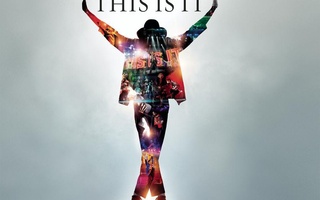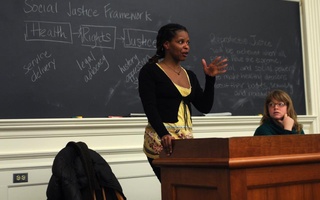If the stuffiness of fat red ties, spick-and-span shoes, and effusive smiles has turned your attention from Washington, it’s time to take another look. The Harvard-Radcliffe Dramatic Club’s production of “Bloody Bloody Andrew Jackson,” which ran at the OBERON until Dec. 8, snatched America’s political history from the textbooks, brazenly reimagining the turbulent story of Old Hickory’s life.
The narrative begins with a young and boisterous Jackson (Jacob A. Brandt ’14) who, within a matter of moments, witnesses those closest to him fall victim to cholera and the cartoon boings of Native American arrows. After Jackson serves as general in the War of 1812, he declares to his wife, “Look Rachel, I love you, but I also got to kill the entire Native population.” And without further ado, Jackson makes his bid for the presidency in 1824, running against the silk-stocking Adams as the voice of the people and the Western Frontier. Jackson—the man who put the “Man” in “Manifest Destiny,” according to the show—finally assumes his position as president in 1828.
Opening with a number entitled “Populism, Yea, Yea!” the musical promptly revealed its unorthodox approach: “Bloody Bloody Andrew Jackson” endeavored to dust off America’s younger years and revitalize them by exploring the ahistorical, ironic, and irreverent character of American youth today. Andrew Jackson’s political platform was transformed into an angsty and adrenaline-charged rock anthem with the opening of the first song. Under the musical direction of Kyra A. Atekwana '14 and Hugh P. Zabriskie '15, the exuberant songs echoed the performance’s thrilling, provocative, and rigorously insightful nature.
Dressing Jackson’s presidential opponent John Quincy Adams (Samuel B. Clark ’15) in red Converse and skinny jeans and Jackson’s presidential groupies (Madison M. Dildine ’16 and Tess V. Davison ’16) in pink cheerleading outfits, the production did away with all forms of historical and theatrical sanctimony, emphasizing the importance of bringing a modern perspective to America’s questionable past decisions. “Bloody Bloody Andrew Jackson” confronted the Trail of Tears and other scandals tainting Jackson’s term head-on. Mercilessly laying bare American guilt, the production removed American history from its glorified narrative and bluntly placed responsibility at the feet of our country’s presidential decisions at the time.
The cast was energetic throughout their performances, springing about the OBERON’s four-sided stage and surrounding the audience, who remained pitted in the theater’s center. The blocking was physically demanding, but the cast met the challenge with assiduity and flare. Replete with sexual innuendo, political no-no’s, and ribald social commentary, the performance bore an unapologetic coarseness. The musical number entitled “Ten Little Indians,” for example, begins with, “Ten little indians standing in a line / One got executed, then there were nine.” Counting all the way down to zero, the song is offensive to a modern audience, but its crudeness successfully highlighted some of America’s shady past.
“Bloody Bloody Andrew Jackson” was not for the faint of heart. Rowdy and lurid, discordant and in-your-face, little could have redeemed this musical for those of more classical taste. Nevertheless, the cast’s physically demanding and impassioned performance, along with the production’s humor, unconventional music, and innovative costumes made for an exhilarating experience. Depicting a trying time in America’s history with a modern spin, “Bloody Bloody Andrew Jackson” was strikingly relevant and thrilling to behold.
Read more in Arts
Excellent, Uproarious "Company"Recommended Articles
-
 “Michael Jackson’s This Is It”
“Michael Jackson’s This Is It” -
 Panel Discusses Link Between Maternal Health and Environment
Panel Discusses Link Between Maternal Health and Environment -
Viva la RevoluciónFeel like you’re fixing to die? Whether you’re headed to Dewey Square or kicking back to Coldplay in the comfort of your room, you’re not alone in your frustration.
-
On the Phone With Composer J. Michael Friedman ’97From the backseat of a cab traversing a Sandy-stricken New York City, Obie Award-winning composer and lyricist J. Michael Friedman ’97 picks up the phone to dial Fifteen Minutes.
-
 Alum Talks ‘Bloody’ Songwriting
Alum Talks ‘Bloody’ Songwriting -
Hibernation Pays Off for My Bloody ValentineLong awaited album is a valentine to loving fans













